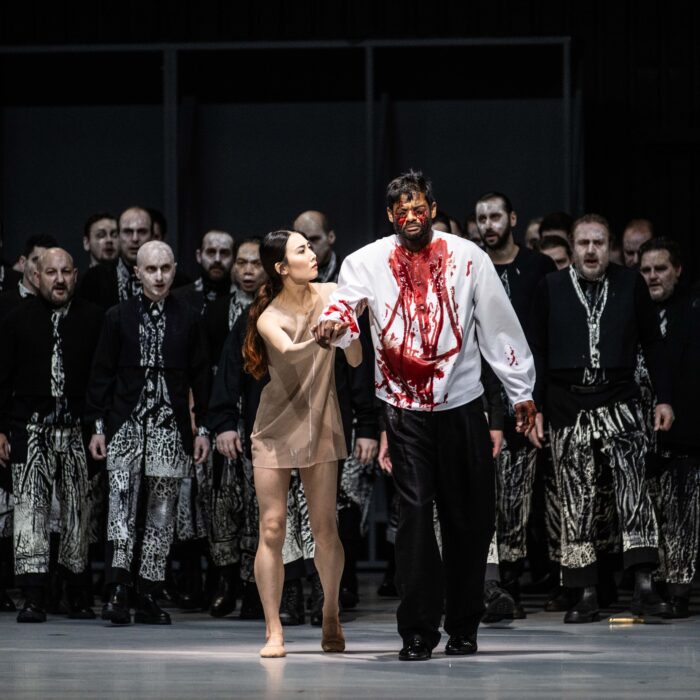
Opéra National de Paris 2018–19 Review: Simon Boccanegra
Great Voices Suffer At The Hands of Merciless Director
By Polina LyapustinaDuring its 350th anniversary season, the Opéra National de Paris presented a new production of one of the most difficult and controversial Verdi’s operas, “Simon Boccanegra.”
With a solid cast and no boundaries of interpretation, Calixto Bieito decided to tell a recklessly modernized story, with characters seemed prohibited from interacting with one another and simply had to ignore each other on stage. The result is that many of the values that Verdi clearly wanted to highlight in his masterpiece (such as Italian unification and overcoming the loss of one’s beloved), were violated and utterly ignored by the direction of Bieito.
A Triumph
This premiere was highly expected mainly because of baritone Ludovic Tézier, an audience favorite, whose voice has developed beautifully to take on the title role of the old Genoa Dodge.
Tézier was a triumph in the role, placing on it his own signature note of despair, which was added to pain, love, and hope alike. He made it sound like only he, and he alone could sing Verdi.
Being highly limited in acting by the director, he filled this gap vocally. You could find a psychological depth and dramatic resonance in his voice with the baritone truly mesmerizing in the most intimate and pained parts. His duet with Amelia, after he realizes she is his long-lost daughter, was warm and full of Father’s love, but the whole scene was destroyed by the decision to avoid all sort of physical contact. So Boccanegra’s glorious call to embrace his daughter felt empty.
The last act’s duet with a brilliant young bass Mika Kares as Fiesco, was probably the best part of the performance. Here Tézier could give himself a chance to sound deeper and stronger, and he definitely succeeded.
Nobility Personified
Mika Kares deserved a separate mention. This 40-years-old bass, managed to perform the role of the old patrician, showing great experience and vocal nobility throughout.
Yes, the director also made a mess of the role of Fiesco, but the damage was perhaps greatest of all. He had to be an aggressor to his dying daughter, playing executioner during “A te l’estremo addio, palagio altero,” he had to appear and then quit the stage without any rhyme or reasons. But despite such strange directions, the greatest impression was his voice. Nobility of expression, acting by voice, strength and eloquence, beauty of tone — it was all there. A big voice with a great future he is.
Winning Over the Audience
Maria Agresta exhibited strong voice and great acting. You could really see her struggling with the role of victim, which was prescribed for her. Even if she couldn’t embrace her father, being incapable to come closer than a meter to Simon, she expressed all the joy and love to him with her entire being. Being kept in dirty clothes, and with disheveled hair, she remained strong and aggressive when needed – she could calm her lover, she could inspire her father.
She started with the sad, but light “Come in quest’ora bruna” and instantly won the audience’s collective hearts. Then she sounded full of confidence and brightness in her duet with Adorno, where she dominated. Every duet or trio with her featured the brightness that Verdi must have imagined for the character in the context of the opera. Her full-bodied singing was supplemented with tenderness and caress; in time she sang with sharper penetration, to highlight her character’s growing strength throughout the opera.
Left To Be Desired
Her partner Francesco Demuro as Adorno mostly succeessful as an actor and his voice left a bit to be desired. It was a real joy to hear him in duets, but main tenor aria “Sento avvampar nell’anima” was lacking in depth and strength. You could also see him physically suffering with the slow tempo. He managed quiet parts with really colorful pianissimo, but was often overpowered by the orchestra in more intense moments.
Fabio Luisi is usually a reliable source of musical solace in the face of an objectionable production, but even the maestro couldn’t summon enough of his magic forces to improve the situation. Although not one of Verdi’s most performed stage-works, Simon Boccanegra is a great field for conductors interpretation. But Luisi seemed to be rather tentative throughout. One wondered how well he was able to see the singers as it seemed that the direction for them to not interact with anyone also seemed to extend to the musical director himself.
Let’s the Talk About Calixto Bieito
As you might have anticipated, this production was not a hit with me. The decision to force the characters to avoid each other obviously undermines the major themes of the opera. But the worst of the “direction” by Bieito was that he added a new character. In his production, Calixto Bieito decided to add and highlight Maria Fiesco. When you see her in the prologue, Jacopo Fiesco drags a plastic sheet with a girl on it. She is still alive. She seems no more than a victim of his. She is moving but isn’t resisting. In the next scene, she is already dead, but stands up and starts her senseless existence on stage almost all the time, half-naked, receiving just anxiety or ignorance from everyone else. Even Simon, after his own death, heads toward her but also abandons her.
A woman, a lover of the main hero, a mother of his beloved child, a great loss for her father, a symbol of memories. Maria, represents all of these virtues in the libretto itself. But here we see her as a victim, before and after death — weak, ignored, with no goal and reason to exist, naked, autopsied and surrounded by rats on the curtain during the interval. What this representation was supposed to mean? Is it the image of a woman we need in contemporary opera? Moreover, how does this support the themes of unity that encapsulate the opera itself?
The French audience, which is rather open and forgiving of Regietheater, didn’t respond particularly well to Bieito’s conception. They were confused and torn between gratitude and adoration for the cast, and a clear rejection toward the production. Enthusiastic applause and even standing ovations to Ludovic Tézier were immediately contrasted by unanimous and vehement boos once production team appeared on stage.



